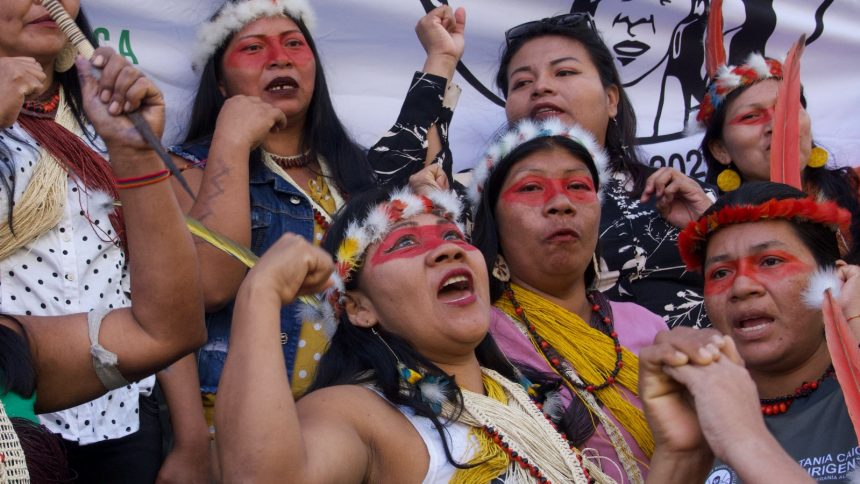This story was originally published by Inside Climate News and is reproduced here as part of the Climate Desk collaboration. Imagine oil workers appearing in your backyard and drilling without warning. Think of constant noise, noxious odors, and routine spills that contaminate your air and water. Then consider all this lasting for decades, with no end in sight and the wealth from the oil sales flowing to people in far-off places.
That is a rough picture of what Ecuador’s Indigenous Waorani people have been living with since the 1970s, when U.S. oil company Texaco arrived and joined a campaign of American missionaries to force contact on families and remove them to evangelical encampments. As oil operations expanded, so too did the nation’s gross domestic product. Crude has powered the economy ever since. Resistance to the industry’s growth was long seen as an impediment to national progress.
But one year ago, Ecuadorians did something extraordinary. In a nationwide referendum, nearly 59 percent of voters chose to leave billions of dollars worth of heavy crude oil in the ground. The ballot measure asked voters whether they wanted to stop operations in three oil fields located inside Yasuni National Park, a part of the Amazon rainforest so biodiverse that there are more species of trees located in one square mile of it than in all of North America. The Ishpingo, Tambococha, and Tiputini (ITT) fields also encompass the territories of uncontacted and recently contacted Waorani families.
Referendums, a form of direct democracy, have long been used in Ecuador. Most have been top-down, called by politicians seeking legitimacy for proposed policies. The Yasuni ITT vote was a rare instance of citizens forcing the government’s hand through grassroots organizing and signature gathering. To some, that makes the ITT referendum all the more legitimate and why many perceive compliance with the vote as a high-stakes moment for Ecuadorian democracy.
This month, the government will pass a deadline, imposed by the nation’s top court, to end oil operations in the ITT fields and remediate the area as the referendum requires. While Ecuadorian president Daniel Noboa appears to have halted planned drilling expansions there, it’s not clear that the government will fully obey the Constitutional Court’s ruling. Noboa pledged to do so during his presidential campaign last year. But in a January television interview, Noboa suggested that the government may delay phasing out operations in the ITT fields to finance its fight against growing drug-related violence.
Today, the state oil company Petroecuador continues to extract and pipe about 55,000 barrels of oil per day from that area. An Ecuadorian provincial court ruled in 2021 that the hundreds of gas flares in the region violated locals’ right to a healthy environment. Ecuadorian embassies in New York City and Washington, D.C., did not respond to requests for comment or emailed questions about whether the government was taking steps to comply with the referendum.
The situation has created tensions both within and outside Ecuador. On the ground in Yasuni, where the oil industry has historically trampled on Indigenous peoples’ rights, individual communities and organizations are planning to challenge the government through new court actions and other forms of resistance and protest.
Outside of Ecuador, the outcome will shed light on whether direct democracy is a viable tool to stop extractive projects with outsized harmful impacts. Communities affected by fossil fuel, mining, and agriculture projects in developing countries have long struggled to defend their land rights and the right to a healthy environment. Ecuador’s ITT referendum offered them a beacon of hope as other governments roll out new plans for fossil fuel extraction and mining projects linked to renewable energy technologies.
Noncompliance or excessive delay with the ITT referendum results could chill enthusiasm for similar direct democracy initiatives in the future, according to David Altman, a political scientist at the Pontificia Universidad Católica in Chile. “If the government keeps extracting oil from Yasuni, the next time someone comes up with a nice idea for a popular initiative, some people will say, ‘What’s the point?’” Altman said. “This frustration could become a frustration toward democracy itself, and that is extremely dangerous.”
Ecuador’s president: ‘We are at war‘
Behind Noboa’s apparent pivot away from his campaign promise to end ITT production is an explosion of crime in the once-tranquil nation. Until a few years ago Ecuador was, unlike its neighbors Peru and Colombia, largely free from drug-related violence. But from 2022 to 2023, Ecuador’s murder rate soared, making it one of South America’s most violent countries. The escalating brutality reared its head during last year’s snap presidential and congressional elections. At an October campaign event in Quito, gunmen assassinated Ecuadorian presidential candidate Fernando Villavicencio, a former journalist who had spoken out about corruption. And earlier this year, violence in the nation of 18 million people again made headlines when masked gunmen took a journalist hostage on live television.
“We are at war,” Noboa said in an interview after the hostage taking.
In April, the president called his own referendum, this time focused on security measures like allowing the military to work with police and increasing some prison sentences. Voters approved the proposals by wide margins. Funding those and other police activities, Noboa has argued, will require a bump in income and closing…
Read more on – https://urlzs.com/7jLsY





